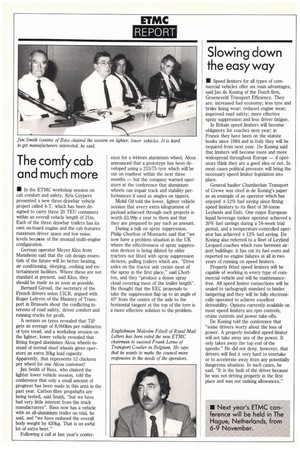Slowing down the easy way
Page 36

If you've noticed an error in this article please click here to report it so we can fix it.
• Speed limiters for all types of commercial vehicles offer six main advantages, said Jan de Koning of the Dutch firm, Groeneveld Transport Efficiency. They are: increased fuel economy; less tyre and brake lining wear; reduced engine wear; improved road safety; more effective spray suppression and less driver fatigue.
In Britain speed limiters will become obligatory for coaches next year; in France they have been on the statute books since 1984 and in Italy they will be required from next year. De Koning said that limiters will become more and more widespread throughout Europe — if operators think they are a good idea or not. In most cases political pressure will bring the necessary speed limiter legislation into place.
General haulier Chamberlain Transport of Crewe was cited in de Koning's paper as an example of an operator which has enjoyed a 12% fuel saving since fitting speed limiters to its fleet of 38-tonne Leylands and Dafs. One major European liquid beverage tanker operator achieved a 20% fuel savings during a 16-week trial period, and a temperature-controlled operator has achieved a 13% fuel saving. De Koning also referred to a fleet of Leyland Leopard coaches which runs between airport buildings: it has cut its fuel costs and reported no engine failures at all in two years of running on speed limiters.
Properly fitted speed limiters will be capable of working in every type of commercial vehicle and will be maintenancefree. All speed limiter connections will be sealed to tachograph standard to hinder tampering and they will be fully electronically operated to achieve excellent driveability. Options currently available on most speed limiters are rpm controls, cruise controls and power take-offs.
De Koning told the conference that "some drivers worry about the loss of power. A properly installed speed limiter will not take away any of the power. It only takes away the top end of the speedo." He did not deny, however, that drivers will find it very hard to overtake or to accelerate away from any potentially dangerous situation. In such cases, he said, "It is the fault of the driver because he was not driving properly in the first place and was not making allowances."






















































































